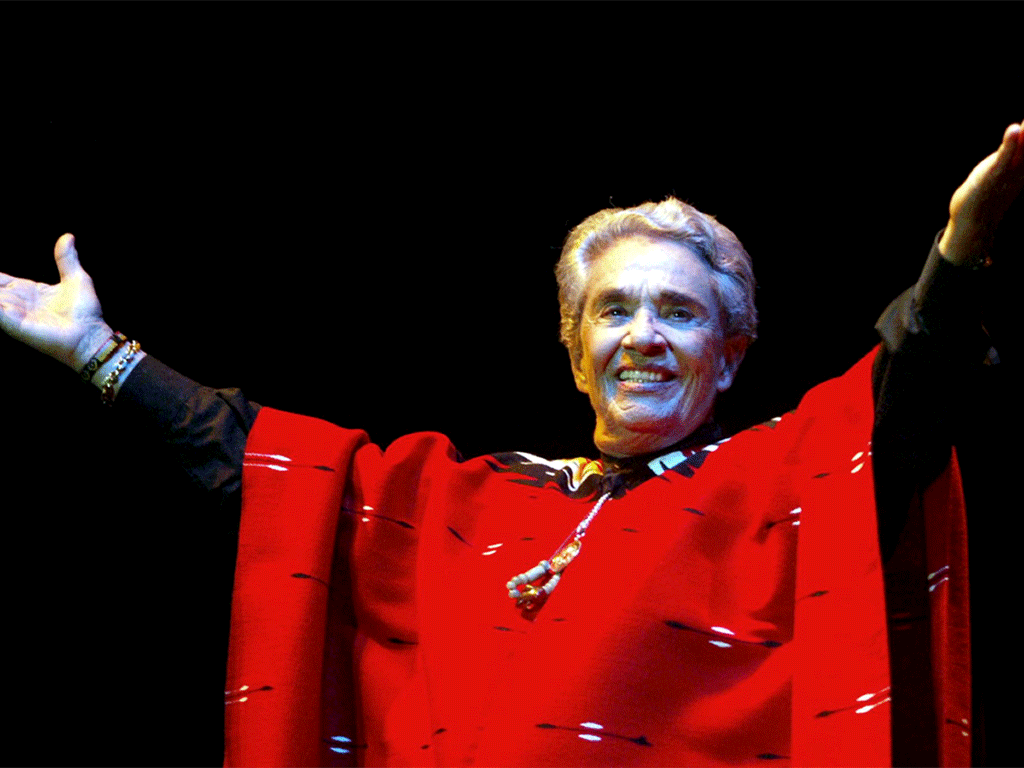Chavela Vargas: Singer adored in the Hispanic world

It could not have been easy being a cigar-smoking, tequila-swigging, gun-toting lesbian who sang cowboy songs in macho Mexico through much of the 20th century. But in a career that lasted for most of her 93 years, Chavela Vargas gradually made inroads into male chauvinist, homophobic and Catholic church prejudices.
She became a monument of Mexican culture, indeed of the Spanish-speaking world, a singer whose "rough voice of tenderness" – the words of the Spanish film-maker Pedro Almodovar – could tear the heart out of anyone who spoke her native tongue. Indeed, like Brel, Piaf, Dylan or the great bluesmen, her 80 albums transcended her own language, transposing Spanish lyrics into the universal language of love, loss, pain and ultimately hope. In her own words, she was "una rareza," a rarity, a one-off.
When she appeared on stage in the 1950s with a bullwhip and a pistol, the audience was never sure whether the gun was loaded. But they knew she was, the bottle of tequila by her side replaced as swiftly as it was drained. With her male hairstyle and wearing trousers beneath her jorongo (poncho), no one knew who she really was. While a similar image has since become common among gay female performers, Vargas was an outlaw. Being gay was against the laws of the land, and of the church, and she formally "came out" only in an autobiography when she was 80. "What hurt was not being homosexual, but what they threw in my face, as if I had the plague," she wrote.
When she sang ranchera, or cowboy, songs, traditionally sung by men, she never did what most women singers tend to do – change the pronouns from "she" to "he." Male artists assumed she was being faithful to the original lyrics. Gay people got the message.
Vargas might never have sung her way into the Mexican and Latin psyche had she not been taken under the wings of many of the great artists of the mid-20th century, including the Mexican writer Juan Rulfo, the Spanish poet Federico Garcia Lorca and the great bolero songwriter Agustin Lara whose works she later performed. After the painters Diego Rivera and Frida Kahlo took her into their home in Coyoacan, the artistic hub of Mexico City, the bisexual Kahlo and Vargas became close. Kahlo's diaries suggest love unrequited by Vargas but the singer refused throughout her life to speak of those days.
A Vargas-Kahlo relationship, however, was brilliantly fictionalised in the Oscar-winning movie Frida (2002), in which the real Vargas, then aged 81, appears as a figure of Death to the young Frida, played by Salma Hayek, Vargas hauntingly singing one of her most famous songs, "La Llorona" (the Woman who Weeps). The film's soundtrack also features a younger Vargas singing her classic "Paloma Negra" (Black Dove) in the stunning sequence in which Frida chops off her hair while demolishing a bottle of tequila in Vargas style.
Almodovar, one of Vargas's greatest champions, had already used her in his own movies, bringing her work to a new generation and inspiring gay men and women throughout the Spanish-speaking world, not least in communist Cuba, after she had gone through what she called "15 years of alcoholic hell." The director featured her, or her songs, in several of his films, including La Flor de mi Secreto (The Flower of my Secret, 1995) and it was he who brought her to the Carnegie Hall in New York in 2003, at the age of 83, for a memorable concert which produced one of her finest live albums. On it, spicing up her classic song "Hacia la Vida", she sang: "Today, I'm going towards life. Before, I was going towards la pinche muerte [goddam death]."
She was 86 when she gave a rousing open-air concert in Madrid's Plaza de España in 2006 and she was back in Spain only a few months ago to perform, from a wheelchair, a new album of Lorca's poems. After her death, Almodovar said: "I don't think there is a stage big enough in this world for Chavela."
Isabel Vargas Lozano was born in the Central American nation of Costa Rica in 1919 and suffered from polio from an early age. She would later attribute her recovery to the shamans, or spiritual guides, she consulted, something she would continue for the rest of her life. After her parents divorced, she was brought up by several uncles whose treatment of her one can imagine from her later words: "May they burn in Hell!" At the age of 14 she hit the Pan-American Highway, hitchhiking north towards the promised land that was the United States. Passing through Mexico City, she busked with mariachis on the zocalo, the grand main square, where she was spotted by Rivera and Kahlo. "They invited me to a party at their house, then to stay with them," she recalled. "I learned every secret of Frida and Diego, secrets I shall never reveal. We were happy, we lived day to day, without a cent, sometimes with nothing to eat, but dying of laughter." She found herself performing in the swanky hotels of Acapulco, at the time vying with Rio and Havana as the magnet for Hollywood celebrities. She sang at the Acapulco wedding of Elizabeth Taylor and Michael Todd in 1957.
A few months ago, Vargas said: "I do not fear death. I don't owe life anything and vice-versa. We're quits." She spent her latter years in the picturesque nahuatl Indian town of Tepoztlan, 45 miles south of Mexico City, where she continued to consult her shamans. She died in hospital in nearby Cuernavaca.
Phil Davison
Isabel "Chavela" Vargas Lizano, singer: born San Joaquin de Flores, Costa Rica 17 April 1919; died Cuernavaca, Mexico 5 August 2012.
Join our commenting forum
Join thought-provoking conversations, follow other Independent readers and see their replies
Comments
Bookmark popover
Removed from bookmarks